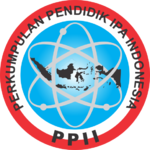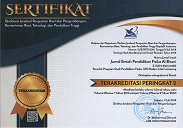Analysis of the Viscosity Value of Packaged Oil with Bulk Oil Using Tracker Video Analysis
Abstract
The utilization of STEM-based technology is essential for activating students in learning. One of the media that can be used in STEM-based learning is the Analysis Video Tracker. Analysis Video Tracker is an application used to analyze speed, velocity, acceleration, force, gravitational field, conversion, and energy conservation. This study used the Video Tracker Analysis application, which aims to observe the effect of object mass in measuring viscosity. Second, to assess the viscosity values between bulk oil and packaged oil. Finally, to examine the reliability of data generated by video tracker analysis application. The research method used in this study is an experimental method of analyzing video recordings of the motion of falling objects into a liquid with Tracker Software version 6.1.0. This research data was analyzed through the Analysis Video Tracker application, excel, and SPSS version 25. The results of the research in this article. First, the mass of the object used to measure affects viscosity time (s), distance traveled (cm), speed (cm/s), and acceleration (cm/s2). Secondly, the viscosity value of bulk oil is higher (3.978 Nm/s2) than packaged oil (3.124 Nm/s2). Third, the data obtained from the video tracker analysis application is reliable or consistent. The results of this research are expected to serve as a reference and alternative in using learning media, especially on the topic of viscosity, and to become a reference in selecting oils for food processing.
Keywords
Full Text:
PDFReferences
Adhikesavan, C., Ganesh, D., & Charles Augustin, V. (2022). Effect of quality of waste cooking oil on the properties of biodiesel, engine performance and emissions. Cleaner Chemical Engineering, 4(December 2021), 100070. https://doi.org/10.1016/j.clce.2022.100070
Akhlis, I., Syaifurrozaq, M., Sugiyanto, Marwoto, P., & Iswari, R. S. (2020). The determination of fluid viscosity using tracker-assisted falling ball viscosimeter. Journal of Physics: Conference Series, 1567(4), 2–6. https://doi.org/10.1088/1742-6596/1567/4/042102
Ali, S. H., Al-Zuky, A. A. D., Al-Saleh, A. H., & Mohamad, H. J. (2019). Measure liquid viscosity by tracking falling ball automatically depending on image processing algorithm. Journal of Physics: Conference Series, 1294(2). https://doi.org/10.1088/1742-6596/1294/2/022002
Asrizal, Pratiwi, T., & Yohandri. (2022). Tool modelling system of atwood machine with remote control of released objects for tracker video analysis. Journal of Physics: Conference Series, 2309(1). https://doi.org/10.1088/1742-6596/2309/1/012043
Chen, T., Yang, Y., Bing, S., Sun, Z., Ma, B., & Yang, Z. (2022). Study on in situ viscosity model of tight oil and its measurement method. Energy Reports, 8, 547–558. https://doi.org/10.1016/j.egyr.2022.02.003
Doringin, F., Tarigan, N. M., & Prihanto, J. N. (2020). Eksistensi pendidikan di era revolusi industri 4.0. Jurnal Teknologi Industri Dan Rekayasa (JTIR), 1(1), 43–48. https://doi.org/10.53091/jtir.v1i1.17
Fadilah, R., & Yohandri. (2019). Need analysis of student worksheet based on tracker on static fluid learning material in high school. Journal of Physics: Conference Series, 1185(1), 0–7. https://doi.org/10.1088/1742-6596/1185/1/012115
Fadlilah, N., Sulisworo, D., & Maruto, G. (2020). The effectiveness of a video-based laboratory on discovery learning to enhance learning outcomes. Universal Journal of Educational Research, 8(8), 3648–3654. https://doi.org/10.13189/ujer.2020.080843
Fahrudin, A. (2022). Pengaruh penggunaan software treker terhadap hasil belajar fisika mahasiswa pada pokok bahasan viskositas fluida. Jurnal Pendidikan Sains Dan Komputer, 2(01), 41–48. https://doi.org/10.47709/jpsk.v2i01.1357
Farisa Wulandari, Natasyaputri Sendhe Siregar, & Riyan Tika Syafitri. (2022). Dampak kenaikan harga minyak goreng terhadap industri kecil menengah (IKM) di Kota Tanjungpinang tahun 2022. Madika: Jurnal Politik Dan Governance, 2(1), 33–41. https://doi.org/10.24239/madika.v2i1.1027
Feser, M. S., & Krumphals, I. (2022). Preparing pre-service physics teachers to diagnose students’ conceptions not covered by physics education textbooks. The Physics Educator, 4(2). https://doi.org/10.1142/S2661339522500081
Fianti, Listiagfiroh, W., & Susilo. (2020). Video tracker analysis: A strategy for measuring students communication and collaboration skills. Journal of Physics: Conference Series, 1567(2). https://doi.org/10.1088/1742-6596/1567/2/022019
Hsu, W. Y., Cheng, Y. W., & Tsai, C. Bin. (2022). An effective algorithm to analyze the optokinetic nystagmus waveforms from a low-cost eye tracker. Healthcare (Switzerland), 10(7). https://doi.org/10.3390/healthcare10071281
Hussain, A. A. A., Vincent-Bonnieu, S., Kamarul Bahrim, R. Z., Pilus, R. M., & Rossen, W. R. (2019). The impacts of solubilized and dispersed crude oil on foam in a porous medium. Colloids and Surfaces A: Physicochemical and Engineering Aspects, 579(July), 123671. https://doi.org/10.1016/j.colsurfa.2019.123671
Jeong, S., Cho, C. H., Lee, J. S., Lee, H. G., & Yoo, S. (2019). Development of active packaging technology for kimchi: One-way gas valve. ACS Symposium Series, 1303, 11–23. https://doi.org/10.1021/bk-2019-1303.ch002
Kazeem, R. A., Fadare, D. A., Ikumapayi, O. M., Akinlabi, S. A., Afolalu, S. A., & Akinlabi, E. T. (2022). Analysis of the physicochemical properties of some selected non-edible vegetable oil-based cutting fluids using the design of experiment (DOE) approach. Lubricants, 10(2). https://doi.org/10.3390/lubricants10020016
Kettle, M. (2020). How videos are used in secondary school physics teaching. Physics Education, 55(3). https://doi.org/10.1088/1361-6552/ab7084
Khairunnisa. (2019). Pembelajaran fisika berbasis tracker dalam penentuan viskositas air menggunakan metode osilasi teredam. PeningkatanMutu Pendidikan MIPA Dan Teknologi Di Era RevolusiIndustri 4.0, September, 108–115.
Maulidah, S. S., & Prima, E. C. (2018). Using physics education technology as virtual laboratory in learning waves and sounds. Journal of Science Learning, 1(3), 116. https://doi.org/10.17509/jsl.v1i3.11797
Munir, R., Amalia, N., & Munir, R. (2022). Physic laboratory by video tracker and visual basic for application at home during covid-19 pandemic: Material elasticity measurement. AIP Conference Proceedings, 2668. https://doi.org/10.1063/5.0113768
Nurrahmah, A., & Firly, S. (2020). Analisis perbandingan penggunaan minyak curah dan minyak kemasan menggunakan uji hipotesis dua proporsi. Bulletin of Applied Industrial Engineering Theory, 2(1), 65–66. http://jim.unindra.ac.id/index.php/baiet/article/view/2846
Ozogul, Y., Kuley Boğa, E., Akyol, I., Durmus, M., Ucar, Y., Regenstein, J. M., & Köşker, A. R. (2020). Antimicrobial activity of thyme essential oil nanoemulsions on spoilage bacteria of fish and food-borne pathogens. Food Bioscience, 36(February). https://doi.org/10.1016/j.fbio.2020.100635
Primaryputri, N., & Suprapto, N. (2019). Buku panduan praktikum fisika dasar 1. Penerbit JDS.
Putra, B. E., & Ayu, D. P. Ni. (2022). Implementasi media pembelajaran fisika berupa tabung viskositas dengan analisis video menggunakan software tracker. Jurnal Pendidikan Fisika dan Sains (JPFS), 5(1), 10–15. https://doi.org/https://doi.org/10.52188/jpfs.v5i1.207
Raflesiana, V., Herlina, K., & Wahyudi, I. (2019). Pengaruh penggunaan tracker pada pembelajaran gerak harmonik sederhana berbasis inkuiri terbimbing terhadap keterampilan interpretasi grafik siswa. Gravity : Jurnal Ilmiah Penelitian Dan Pembelajaran Fisika, 5(1), 1–12. https://doi.org/10.30870/gravity.v5i1.5207
Ramadhanti*, D., Kuswanto, H., Hestiana, H., & Azalia, A. (2021). Penggunaan analisis video gerak kucing melompat berbantuan aplikasi tracker sebagai kegiatan praktikum mandiri materi gerak pada peserta didik SMP. Jurnal Pendidikan Sains Indonesia, 9(3), 459–470. https://doi.org/10.24815/jpsi.v9i3.20547
Rosmalinda, R. (2019). Analisis viskositas dan indeks bias terhadap kualitas minyak goreng kemasan dan curah. Jurnal Hadron, 1(02), 17–21.
Safari, A., Salamat, R., & Baik, O. D. (2018). A review on heat and mass transfer coefficients during deep-fat frying: Determination methods and influencing factors. Journal of Food Engineering, 230, 114–123. https://doi.org/10.1016/j.jfoodeng.2018.01.022
Satriawan, M., Rosmiati, R., Widia, W., Sarnita, F., Suswati, L., Subhan, M., & Fatimah, F. (2020). Physics learning based contextual problems to enhance students’ creative thinking skills in fluid topic. Journal of Physics: Conference Series, 1521(2). https://doi.org/10.1088/1742-6596/1521/2/022036
Suryabrata, S. (2011). Metode penelitian. PT. Raja Grafindo Persada.
Susanti, H., & Asmoro, C. P. (2019). Rekonstruksi Set Alat Percobaan Viskositas. WaPFi (Wahana Pendidikan Fisika), 4(1), 31. https://doi.org/10.17509/wapfi.v4i1.15812
Susilawati, S., Satriawan, M., Rizal, R., & Sutarno, S. (2020). Fluid experiment design using video tracker and ultrasonic sensor devices to improve understanding of viscosity concept. Journal of Physics: Conference Series, 1521(2). https://doi.org/10.1088/1742-6596/1521/2/022039
Sutanto, S., Rahman, R., & Abriana, A. (2016). Pengaruh pengulangan penggorengan terhadap kandungan asam lemak bebas dan viskositas minyak hasil penggorengan. Jurnal Ecosystem, 16(3), 498–514. https://journal.unibos.ac.id/eco/article/view/933/484
Uçar, Y., Durmuş, M., Küley, E., & Korkmaz, K. (2022). Inhibitory effect of rosemary essential oil and its nanoemulsion on the formation of biogenic amines by food-borne pathogens and fish spoilage bacteria. Yuzuncu Yil University Journal of Agricultural Sciences, 32(1), 199–212. https://doi.org/10.29133/yyutbd.1035443
Wahyuni, N. P. (2021). Penerapan model pembelajaran berbasis STEM untuk meningkatkan hasil belajar IPA. Jurnal of Education Action Research, 5(1), 109–117.
Wendin, K., Martensson, L., Djerf, H., & Langton, M. (2020). Product quality during the storage of foods with insects as an ingredient: Impact of particle size, antioxidant, oil content and salt content. Foods, 9(6). https://doi.org/10.3390/foods9060791
Yasin, A. I., Prima, E. C., & Sholihin, H. (2018). Learning electricity using arduino-android based game to improve stem literacy. Journal of Science Learning, 1(3), 77. https://doi.org/10.17509/jsl.v1i3.11789
DOI: http://dx.doi.org/10.24042/jipfalbiruni.v12i2.15174
Refbacks
- There are currently no refbacks.

Jurnal ilmiah pendidikan fisika Al-Biruni is licensed under a Creative Commons Attribution-ShareAlike 4.0 International License.
![]()







